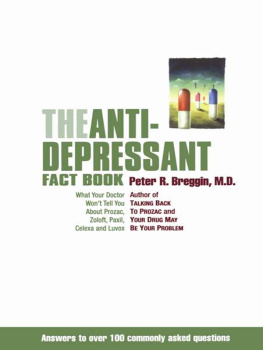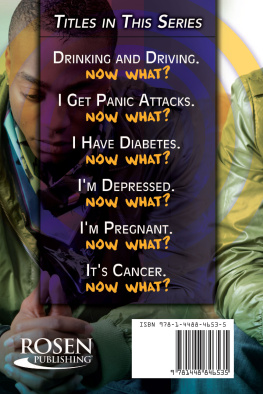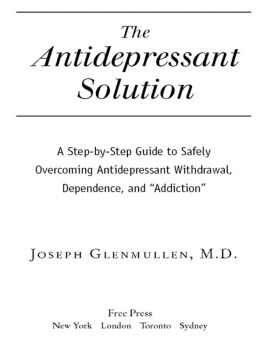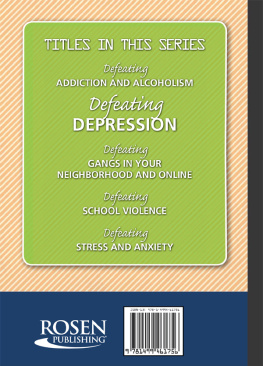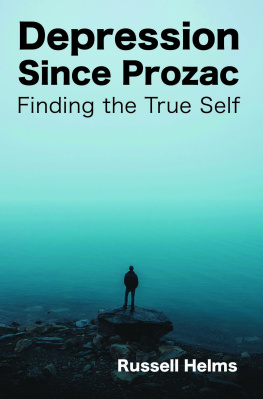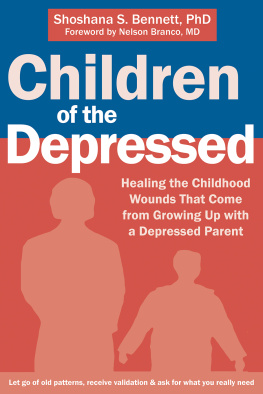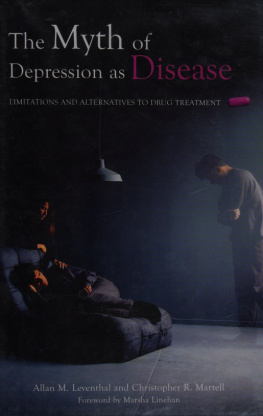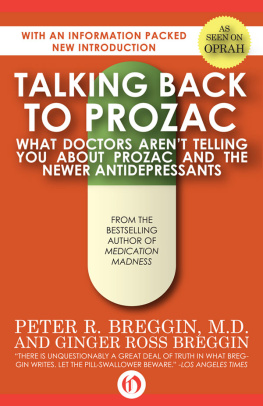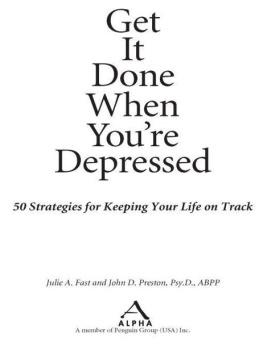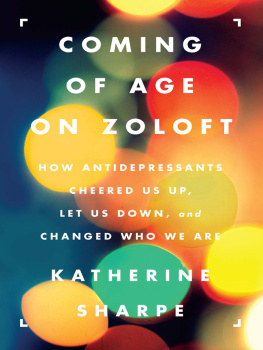THE
ANTIDEPRESSANT
FACT BOOK
Books By Peter R. Breggin, M.D.
Nonfiction
College Students in a Mental Hospital: An Account of Organized
Social Contacts Between College Volunteers and Mental Patients in a
Hospital Community (1962) (Jointly authored with Umbarger et al.)
Electroshock: Its Brain-Disabling Effects (1979)
The Psychology of Freedom: Liberty and Love as a Way of Life (1980)
Psychiatric Drugs: Hazards to the Brain (1983)
Toxic Psychiatry: Why Therapy, Empathy and Love
Must Replace the Drugs, Electroshock and
Biochemical Theories of the New Psychiatry (1991)
Beyond Conflict: From Self-Help and
Psychotherapy to Peacemaking (1992)
Talking Back to Prozac: What Doctors Arent
Telling You About Todays Most Controversial Drug (1994)
(Coauthored by Ginger Ross Breggin)
Psychosocial Approaches to Deeply Disturbed Persons (1996)
(Coedited by E. Mark Stern)
Brain-Disabling Treatments in Psychiatry: Drugs,
Electroshock and the Role of the FDA (1997)
The Heart of Being Helpful: Empathy
and the Creation of a Healing Presence (1997)
The War Against Children of Color: Psychiatry Targets
Inner-City Youth (1998) (Coauthored by Ginger Ross Breggin)
Your Drug May Be Your Problem: How and Why to Stop Taking
Psychiatric Medications (1999) (Coauthored by David Cohen)
Reclaiming Our Children: A Healing
Solution for a Nation in Crisis (2000)
Talking Back to Ritalin: What Doctors Arent
Telling You About Stimulants for Children (rev. ed. 2001)
Fiction
The Crazy from the Sane (1971)
After the Good War (1972)
The
ANTIDEPRESSANT FACT BOOK
What Your Doctor Wont Tell You About Prozac, Zoloft, Paxil, Celexa, and Luvox
PETER R. BREGGIN, MD
To my editor, Marnie Cochran,
and to my agent, Andrew Blauner
Many of the designations used by manufacturers and sellers to distinguish their products are claimed as trademarks. Where those designations appear in this book and Da Capo Press was aware of a trademark claim, the designations have been printed in initial capital letters.
Copyright 2001 by Peter R. Breggin
All rights reserved. No part of this publication may be reproduced, stored in a retrieval system, or transmitted, in any form or by any means, electronic, mechanical, photocopying, recording, or otherwise, without the prior written permission of the publisher. Printed in the United States of America.
Cataloging-in-Publication Data is available from the Library of Congress.
ISBN-0-10:7382-0- 7382-0451-0451-X ISBN-13: 978-0-7382-0451-2
eBook ISBN: 9780786741823
Da Capo Press is a member of the Perseus Books Group.
Find us on the World Wide Web at http://www.dacapopress.com
Da Capo Press books are available at special discounts for bulk purchases in the U.S. by corporations, institutions, and other organizations. For more information, please contact the Special Markets Department at the Perseus Books Group, 11 Cambridge Center, Cambridge, MA 02142, or call (617) 252-5298 or (800) 255-1514, or e-mail
Text design by Elizabeth Lahey
Set in 10.5-point Sabon by Perseus Publishing Services
First printing, July 2001
A Reader Alert
The Antidepressant Fact Book is about depressionhow to think about and treat it. The focus is on the newer antidepressants, especially the SSRIs, and how they affect the brain and mind. The goal is to bring you facts that you will not find in other sources. The SSRIs, with their chemical names in parentheses, include:
Prozac and Sarafem (fluoxetine)
Zoloft (sertraline)
Paxil (paroxetine)
Celexa (citalopram)
Luvox (fluvoxamine)
The book will also discuss other relatively new antidepressants, especially in comparison with the SSRIs, including Effexor (venlafaxine), Serzone (nefazodone), Wellbutrin or Zyban (bupro-prion), and Remeron (mirtazapine).
Antidepressants are not only dangerous to use, withdrawal reactions can make them dangerous to stop taking. Especially when used for more than a few weeks or in larger doses, they can cause potentially severe withdrawal reactions, including anxiety, depression, and suicidal feelings. It is best to withdraw from these drugs gradually and with the help of an experienced professional.
No book can substitute for a clinical evaluation or experienced professional help, but this book will provide you information that is unavailable anywhere else. It can make you a much better informed consumer and help you choose for yourself between the conflicting claims being made by professionals about how to deal with depression.
Acknowledgments
My assistant, Ian Goddard, has been very helpful in searching out new scientific material and in editing several of the chapters. My senior editor, Marnie Cochran, and my project editor, Marco Pavia, remain as wonderful as ever. I cannot thank my agent, Andrew Blauner, enough for his support.
My wife, Ginger, continues to inspire and help me in everything I do. With each succeeding publication, I try to find another way to express my gratitude to her for how she infuses all of my life with spirit and intelligence, as well as just plain help. I grow speechless with the effort of thanking her.
Finally, I want to thank Kevin McCready, Ph. D., for his helpful editing, but even more so for his contributions as the founder and director of the San Joaquin Psychotherapy Clinic in Clovis, California. Dr. McCreadys clinic is unique in helping people withdraw from psychiatric drugs and in providing drug-free treatment for even the most difficult and distressed individuals. His dedication and courage in developing the San Joaquin Psychotherapy Clinic have established a higher standard for the entire profession.
Introduction: Drug Facts You Cannot Get Anywhere Else
Tens of millions of people have turned to a new class of antidepressants that now includes Prozac, Zoloft, Paxil, Celexa, and Luvox. These drugs are called SSRIsSelective Serotonin Reuptake Inhibitorsbecause of their action on the neurotransmitter or chemical messenger named serotonin. Prozac, Zoloft and Paxil are among the largest selling drugs in the world.
In 2000 the manufacturer of Prozac, Eli Lilly and Co., claimed that more than 35 million people worldwide had taken their antidepressant drug. In the previous year, Prozac had generated more than one-quarter of the companys $10 billion in revenue. Prozac, Zoloft, and Paxil are among the top-selling drugs in the United States, with total sales exceeding $4 billion per year.
The drug companies who manufacture and sell these drugs are so wealthy and powerful that they can influence and sometimes direct the basic institutions of our society. As a result, promotion for the SSRI antidepressants has changed the way many people view themselves when they become depressed. In response to an enormously expensive and successful marketing campaign, more and more people think that depression is biochemical and that they ought to try one or more of these drugs if they feel depressed.
Too Little Skepticism
Most Americans realize that the manufacturers and distributors of consumer goods cannot be trusted to inform the public about all the dangers involved in using their products. The public was recently treated to the sight of televised congressional hearings at which the Ford Motor Company and Firestone Tire Co. executives pointed their fingers at each other in regard to the deadly rollovers that have afflicted the Ford Explorer. Ford blamed faulty tires and Firestone blamed faulty automobiles. Sophisticated citizens probably didnt fully believe either one of them.

